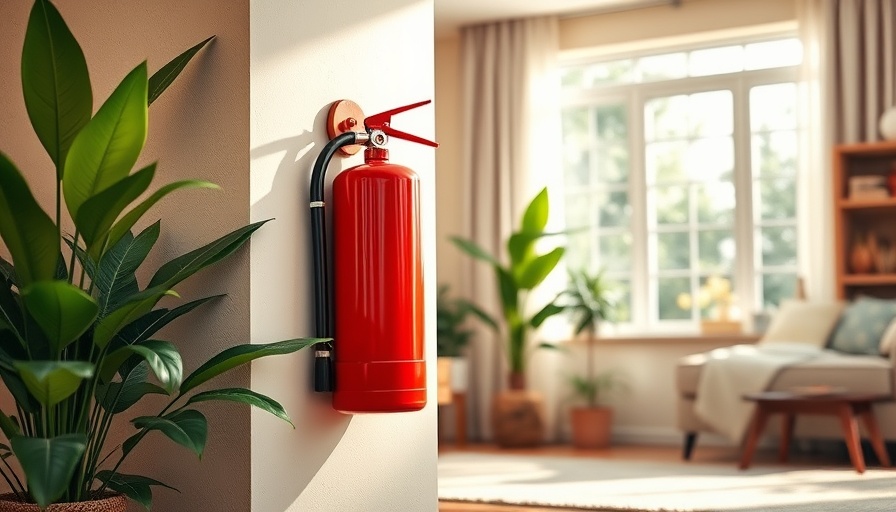
Essential Fire Safety: Why Every Home Needs a Fire Extinguisher
When it comes to home safety, fire extinguishers are often an afterthought for many homeowners. However, they play a crucial role in protecting lives and property. Having strategically placed fire extinguishers can help mitigate the disastrous effects of fires caused by kitchen mishaps or faulty wiring. This article will guide you through selecting the right type of fire extinguisher for your home and where to place them for optimal safety.
Understanding the Different Classes of Fire Extinguishers
Not all fires are the same, which is why knowing the different classes of fire extinguishers is vital. Here's a breakdown:
- Class A: Designed for ordinary combustibles like wood, paper, and cloth. Ideal for rooms like living areas and bedrooms.
- Class B: Best for flammable liquids such as oils and gasoline. These are a must-have in garages or workshops.
- Class C: Made specifically for electrical fires, these extinguisher types are crucial for home offices and electronics-heavy areas.
- Class K: Specifically tailored for kitchen fires resulting from cooking oils and fats. A Class K extinguisher should always be on hand in the kitchen.
Strategic Placement of Fire Extinguishers: A Room-by-Room Guide
Different rooms present different fire risks. Here's how to position extinguishers effectively:
- Kitchen: With cooking being the leading cause of household fires, place a Class K or ABC-rated extinguisher readily accessible but away from the stove.
- Garage/Workshop: Use a Class B or ABC extinguisher considering the likelihood of flammable liquids and potential electrical hazards.
- Living Room & Bedrooms: Opt for a Class A or ABC extinguisher, particularly if space heaters or candles are used frequently.
- Laundry Room: Due to the risk posed by dryer lint, equip this area with an ABC extinguisher.
- Outdoor Areas: For grills and fire pits, a weather-resistant ABC extinguisher can serve as protection.
How to Choose the Right Fire Extinguisher for Your Home
When selecting a fire extinguisher, consider the following:
- Assess the fire risk zones in your home. For instance, a kitchen fire extinguisher must be suited for grease fires.
- Understand the labeling on fire extinguishers; letters represent the classes of fires they can extinguish, while numbers indicate their firefighting capabilities.
- The size of residential extinguishers typically varies from 2 to 10 pounds. Larger extinguishers may have greater power but require more effort to operate.
- Regular maintenance is crucial. Implement a system to check extinguishers periodically. Consider using fire extinguisher rental services for convenience.
Common Misconceptions About Fire Extinguishers
There are several misconceptions that can pose risks when it comes to fire safety:
- Myth: One extinguisher can handle all types of fires. Fact: Each class is designed for specific types of fires, and it's essential to have the right type on hand for each area.
- Myth: Fire extinguishers don’t need maintenance.Fact: Regular checks ensure they are functional when you need them most.
Creating a Fire Safety Plan: Involve the Family
Enhancing home safety involves more than just obtaining fire extinguishers. It’s essential to develop a family fire safety plan. Here are a few steps:
- Conduct regular fire drills to ensure everyone knows how to respond in an emergency.
- Discuss what to do if a fire occurs in the kitchen, garage, or during outdoor activities.
- Ensure everyone in the household knows the locations of fire extinguishers and how to use them.
Conclusion: Equip Yourself with the Right Tools
Understanding fire safety and having the right extinguishers positioned properly can make a decisive difference in emergency situations. Homeowners in Connecticut, particularly in areas like Fairfield County, should take proactive measures to address fire risks in their homes. By following the guidelines presented in this article, you can ensure your home is better prepared for emergencies. Remember, a little preparation today can safeguard your loved ones tomorrow!
Learn more about fire safety measures and how they can protect your home.
 Add Row
Add Row  Add
Add 




 Add Row
Add Row  Add
Add 

Write A Comment